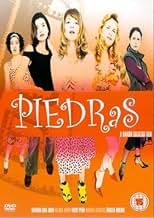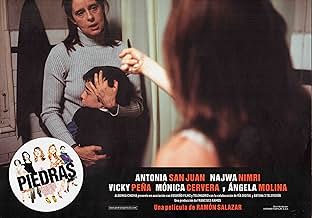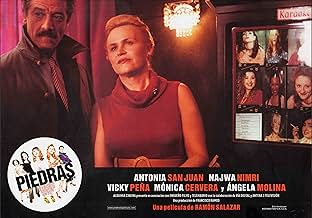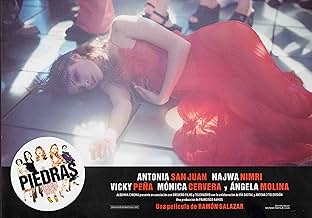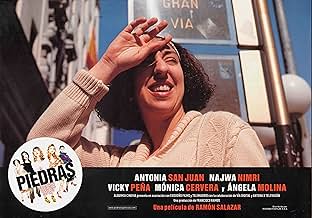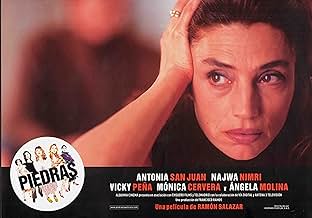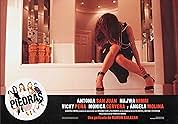Aggiungi una trama nella tua lingua"In life, we first organize large stones (Piedras) such as love, friendship, family, and a career." In this way, we will find space between these to fit smaller stones, our small necessities... Leggi tutto"In life, we first organize large stones (Piedras) such as love, friendship, family, and a career." In this way, we will find space between these to fit smaller stones, our small necessities. If you act in an inverse way, you will not have the room for larger stones. The five pro... Leggi tutto"In life, we first organize large stones (Piedras) such as love, friendship, family, and a career." In this way, we will find space between these to fit smaller stones, our small necessities. If you act in an inverse way, you will not have the room for larger stones. The five protagonists of my film are women who have not been able to organize the large "stones" in th... Leggi tutto
- Regia
- Sceneggiatura
- Star
- Premi
- 9 vittorie e 6 candidature totali
Recensioni in evidenza
specially about non real characters, i think that someone just wrote that only because he never lived in the Spanish society like i did (and i'm not Spanish), is a very real film with real characters, very well done by one of the best Spanish actress Antonia San Juan.
about be a European film in contrast with an American film, well we different societies, personally i dislike American modern films a lot (i like the classics and some of the Andy American films but they are very few).
Is a film about the continuous Constitution of a person, liked or not we all make mistakes but some can learn about the mistakes.
Other characters are used to connect the five main women characters. In storytelling not everything is given away in the beginning: Some connections are established surprisingly late in the movie and that adds to the experience. The shoe-theme is driven to extremes: For example when Leire as a shoe-designer and working in a shoe store where she steals her shoes faints, she breaks one of her heels.
In editing small connections are made between the scenes. A telephone rings, a cigarette is lit, a song, etc. are used to make the connection and fast cuts. Frequent change of storyline keeps it from being boring or reaching TV-levels. It is strongly music-driven to set tone and atmosphere. The cities of Madrid and Lisbon serve as the backdrop for the stories, and shots of those cities are used to extend the story beyond the characters. One of the more moving shots is when Anita, who makes the same walk every day, widens her walk and restricted life from the relative calm of her street to the busy main road: How the restriction of space is visually translated is well done. As with most Spanish movies a lot of storytelling is done visually, using the soap-like stories as the simple backdrop. There is a poetic ending that is somewhat romantic and sentimental but is still beautiful.
As Ramón Salazar is too much in love with his own material it is overlong. Some scenes are kitsch and on the soap level, including the acting (Adela's love life, Isabel's doctor). The shoe-theme is exaggerated and is a weak metaphor.
This is often compared to Magnolia because the structure is the same. But they are different. Magnolia is more technically competent, but somewhat mechanical. This has more the ability to translate emotion and atmosphere visually. After seeing this, you are inclined to immediately move to the new movie-city: Madrid.
There are different stories here, which become connected. One is about the retarded girl, who doesn't dare to pass the street to the next block. One is about the middle-aged woman who finds the lover of her life in a foot fetischist. Another is about the girl with drug problems who's lover leaves her. Still another one is about the madame of a brothel who (almost) finds true love.
Definitely worth seeing. It's in Spain the moviemakers take women seriously.
Not that all performances are excellent, though. Of all leading ladies, they range from average (Najwa Nimri) to very good (Vicky Peña), but the standing ovation should be directed to newcomer Mónica Cervera, who convincingly plays Antonia San Juan's retarded daughter. Enrique Alcides is irresistibly charming as the girl's male nurse, and there are nice small turns from Andrés Gertrúdix, Geli Albaladejo and the director himself, Ramón Salazar.
"Piedras" is beautifully written and filmed, when I watched it I got so moved that I couldn't stop thinking of it for days. I highly recommend it.
What may have been light-hearted and superficial, quickly switches gear with the a superb dysfunctional couple scene that leaves the viewer riveted for minutes, seeing the love or lack thereof, the pain, the confusion, the hope, the needs and escape mechanisms develop through minutes different rooms of the house and down to the street and eventually below... What a scene (!) , but there will be others as effective to follow and strengthen the strong characterization and directing displayed in this slice of life affair.
Moving along, a woman has lost the husband she loved and inherited his kids and his taxi, while another has completely lost her husband emotionally, sexually, intellectually, but not physically. A ghost, a pending divorce reproach, regret & remorse. A new love? Can you love a mirage? Can you love the person in the mirror? Can you love someone you can't love? Or think you can't love? Can you love and live life even though it will always be somewhat hopeless? Yet isn't it exactly these hopes and dreams that keep us here grounded and in a spectrum of relative happiness? A lot of deep themes emerge and the final act brings people and ideas together to coalesce in an existential crisis with no clear cut solution, definitive decision or effective healing. Maybe a elusive thought, a fleeting feeling, but a lasting appreciation of life and of the artistry and intellect of the film. Live. Live again. Rewind the reel. Unveil the real, the important; the big stones (piedras) of life. The rest is just details.
Lo sapevi?
- QuizFanny de Castro is of Spanish ancestry.
- BlooperIn the second scene at the chiropodist, a cameraman can be seen reflected in the glass window.
- Versioni alternativeThe 2004 UK Cinema Club DVD was cut by 19 secs to remove shots of a dog being swung from a balcony by its lead. The cuts were waived for the 2010 Arrow release.
- ConnessioniFeatures La corsa pazza di Sorella Sprint (1967)
I più visti
Dettagli
Botteghino
- Lordo in tutto il mondo
- 1.013.638 USD
- Tempo di esecuzione2 ore 15 minuti
- Colore
- Mix di suoni
- Proporzioni
- 2.35 : 1
Contribuisci a questa pagina


